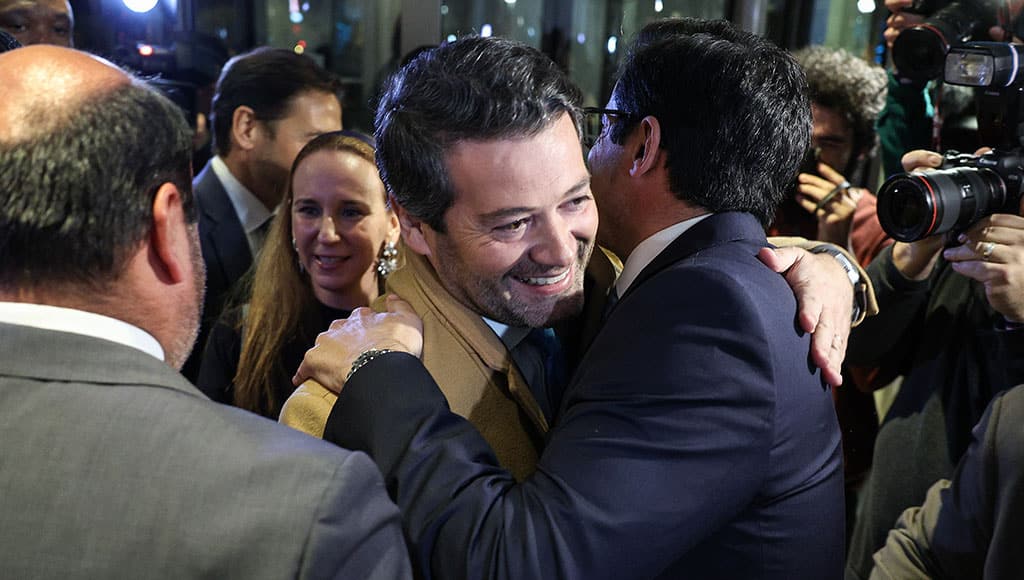It’s been quite the time recently in Portuguese politics, and in my world too, where I decided to interview a CHEGA politician, one Miguel Nunes Silva, in the aftermath of the Portuguese election.
As I’ve said previously, I admire what I perceive to be a willingness in Portuguese people and their culture to converse where there is conflict, and to choose dialogue where there’s division. And it was in that spirit that I decided to invite the Oeiras councilman to talk with me on my breakfast programme.
The word chega, by the way and in case you didn’t know, means ‘enough’, signifying his party’s intention to draw a line, stand against and shake a fist at what they see are intolerable levels of corruption, incompetence and immigration.
With CHEGA experiencing a considerable upsurge in support based on this strategy, it seemed only right (no pun intended) to find out if we immigrants should fear those we are led to believe are most openly hostile towards us, and who are so readily described as ‘far right’, ‘extreme’ and ‘populist’ in the eyes of their unsettled political opponents and the media.
I say ‘opponents’, rather than political colleagues, because – at the time of writing – it looks as if CHEGA have realised their aim of becoming the ‘king maker’ to the winning team, who need their support to govern, but refuse (at least as I write) to work with them, in the Portuguese parliament, and therefore legislature.
So, let’s first, with the help of other foreigners, examine CHEGA’s popularity, in our shared curiosity and concern about the fast-rising political force that won 48 seats in the election. This, compared to the winners, the Democratic Alliance (AD) led by Luís Montenegro, who gained 79 seats, just two seats ahead of nearest rivals and traditional opponents, the Socialist Party (PS), whose António Costa, Portugal’s most recent Prime Minister, created the circumstances for the loss his party ultimately suffered.
One Good Morning Portugal! community member suggested: “When a government fails to care for its working class, the conditions are ripe for radical changes,” which, to me, perfectly sums up the context for CHEGA’s meteoric popularity.
“Explaining CHEGA’s rise is simple and does not require in-depth social or political studies,” added another, Portuguese, associate António Barbosa, who also commented: “This is not an issue of xenophobia, but of social justice. Locals witness daily the disparity between those who contribute to society and those who appear to receive benefits without contributing in kind. This gap fuels support for CHEGA, as people feel increasingly marginalised.”
Douglas Hughes, a fellow lover of Portuguese culture, had this to say in his assessment of the CHEGA shuffle: “(Portuguese) people see demographic changes that threaten the way of life which, utterly perversely, so many expats wax lyrical about. It’s about the long-term future of language, culture and quality of Portuguese life.”
Addressing the extremist labelling and whether they should be feared, my CHEGA correspondent said: “I think it’s less so now. I don’t think people take it as seriously. Listen, the founders of the party came from PSD and CDS (traditional, mainstream parties). So, if it is a party of fascists, they would have to be very well camouflaged fascists, for decades, is all I can say.” Adding reassuringly: “There is no tradition of extremism in Portugal.”
Peter Moore, a Tomar-based Brit with a deep interest in Portuguese history and culture, however, told me that he had analysed the CHEGA Manifesto from the perspective of liberal democracy, the form of government which most of the world has used for over a century, which can be defined as a form of democracy in which the power of government is limited, and the freedom and rights of individuals are protected, by constitutional established norms and institutions.”
Peter says: “Its underlying basic principles are pluralism and toleration,” which sounds very Portuguese to me.
“That is, the dispersal of political power among a variety of interest groups and the acceptance of conflicting political viewpoints or priorities between groups. It emphasises the resolution of political disagreements, where possible, within a constitutional framework through the rule of law and separation of powers, an independent judiciary and the protection of individual civil rights,” he continues.
“CHEGA purports to uphold these values. But a line-by-line analysis shows some very worrying signs about what CHEGA or a CHEGA-influenced government could mean in practice. Particularly for anyone who is a member of any kind of minority. That would include foreigners, immigrants, gay and lesbian, transgender, etc.”
In large doses, Peter suspects that they would “substantially alter the current Portuguese culture of openness and toleration of others. Friendly welcoming Portugal would be less friendly and less welcoming.”
Returning to Miguel Silva, he sees his party’s position as hardly extreme: “If you look at CHEGA’s program, I think it’s pragmatic. What we’re referring to when we say controlling immigration is mostly controlling illegal immigration, having some quotas and not having mass immigration and some common-sense policies.”
Addressing what is in our times the slur of ‘populism’, my CHEGA interviewee said unapologetically: “I don’t think that CHEGA are populists at all, because we’re all willing to be controversial and we’re all willing to be hated. I would say, I would argue, that the true populists are the people who really do run their political conduct according to the polls.”
When all is said and done (and let’s face it, a lot is being said, and for the time being, little will get done), it appears the bark of CHEGA is – despite much hyperbole and rancour – far worse than its bite into the Portuguese political psyche.
One could argue that it’s a non-elected group of public servants that hold a far greater sway over the prospective and day-to-day lives of foreigners: the management and shopfloor workers of AIMA, formerly SEF, as well as the many outsourced functionaries of the Portuguese government around the world in VFS and consular offices.
It is these people who we might fear more, burdened as they continue to be by a staggering backlog of visa applications and renewal cases, a recent and heavily laboured reorganisation, and any dissatisfaction they may have with their working conditions.
As the weeks go by, the administrative mountain grows and public dissatisfaction increases, with some migrants taking to the streets to voice their frustration and disappointment. This, you could say, is the immigration problem that might concern us most, and not CHEGA, the gift to the political establishment, whose stagnation can be shrouded by the upstart sensation.
Whether you feel ‘enough’ is enough or want to scream “enough, already”, amid the angst they so easily generate, I’d say CHEGA may well turn out to be the least of our worries.
Carl Munson is host of the Good Morning Portugal! show every weekday on YouTube and creator of www.learnaboutportugal.com, where you can learn something new about Portugal every day!
















